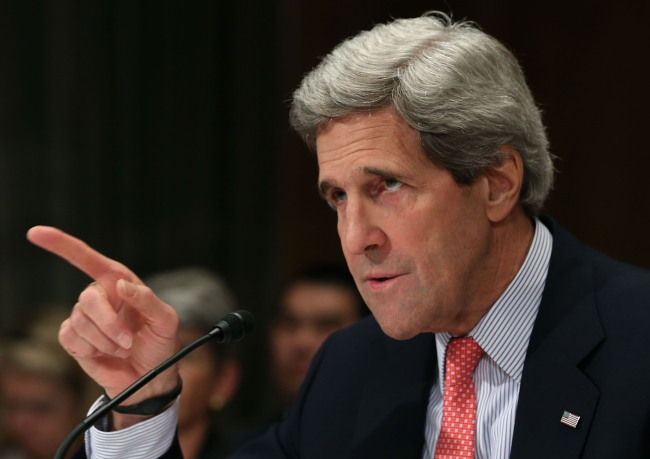 |
존 케리 미국 국무부 장관 (AFP) |
존 케리 미국 국무장관은 최근 북한이 제시한 북미 대화의 선결조건에 대해 “수용할 수 없다”며 이 요구들이 ‘초반 첫수’라고 평가했다.
북한은 목요일 지난주 한국을 방문한 케리 장관이 북한 핵문제를 둘러싼 긴장 완화를 위해 협상 테이블로 돌아오라는 제의에 대해 처음으로 반응을 보였다.
북한은 미국과 한국이 대화를 원한다면 유엔안정보장이사회의 제재 결의를 철회하고, 한미 공동 군사훈련을 영구적으로 중단해야 한다고 주장했다.
케리 장관은 의원들에게 “협상에 대해 처음 언급한 것”이라며 “북한의 초기 전략적 행동으로 바라볼 준비가 돼있다”고 말했다.
케리 장관은 서울과 베이징, 도쿄로 이어진 동아시아 순방 기간 동안 미국이 평양과 대화를 할 준비가 되었다고 밝힌바 있다.
그는 “미국이 “식량지원을 하겠다. 무엇을 주겠다 하면 그제야 대화가 진행되는” 과거에 수없이 되풀이 되어온 패턴으로 돌아가지 않겠다며 “우리는 근본적인 결정을 해야 한다”고 덧붙였다.
케리 장관은 자연스럽게 중국의 협조가 필수적이라는 논리를 전개했다.
그는 “중국은 지역의 불안정성이 높아지고 있다”고 판단하고 있다면서 “이번 자신의 동아시아 순방 기회에 중국 측과 솔직하고 진지한 토론을 했다”고 전했다.
이에 따라 중국을 향해 지난 20년간 되풀이해온 패턴을 확실하게 바꾸자면서 '중국의 영향력'을 새삼 부각시켰다.
그는 “북한에 대해 중국만큼 영향력을 가진 나라가 없다”면서 연료와 식량을 지원하고 금융거래와 대규모 교역을 하는 북중 관계를 상기시켰다.
중국은 북한에 대해 “중요한 영향력을 행사할 능력을 보유하고 있다”고 단언했다.
케리 장관은 전날 하원 외교위원회에 나와서도 거의 같은 맥락의 발언을 했다.
중국 지원이 없으면 북한이 무너질 것이라는 말까지 했다.
북한의 핵공격 위협 때문에 한반도의 위기감이 고조되던 지난주 한국과 중국, 일본 방문을 마치고 돌아온 그가 연일 이런 발언을 하는 것은 북한의 추가도발이 일어나지 않는 것을 전제로 미국도 조만간 대화를 재개할 의지가 있다는 것을 반영해 주는 것으로 외교가는 보고 있다.
<관련 영문 기사>
Kerry says N.K. talks conditions ‘unacceptable’
U.S. Secretary of State John Kerry Thursday dismissed a set of pre-conditions laid out by North Korea for talks as “unacceptable,” calling them an opening “gambit” from Pyongyang.
The isolated North on Thursday responded for the first time to an offer from Kerry during his weekend visit to the Korean peninsula to return to the negotiating table in a bid to defuse heightened nuclear tensions.
The demands by the North’s main military body included the withdrawal of UN sanctions and a permanent end to South Korea-U.S. joint military drills.
“That’s the first word of negotiation or thought of that we’ve heard from them since all of this has begun,” Kerry told U.S. lawmakers.
“So I’m prepared to look at that as... at least a beginning gambit -- not acceptable, obviously, and we have to go further.”
The North’s offer followed a month of increasingly hostile exchanges between Pyongyang, Seoul and Washington that have included threats of nuclear war and precision missile strikes.
During a trip to Seoul, Beijing and Tokyo, Kerry repeatedly stressed Washington was ready to talk to Pyongyang provided it was serious about reining in its nuclear program.
The U.S. would not return to past cycles of “here’s a little food aid, here’s a little of this, then we’ll talk,” Kerry told the Senate foreign relations committee, adding “we’ve got to make some fundamental determinations here.”
While in Beijing, Kerry sought to persuade China, North Korea’s main ally, to use its leverage to defuse the tensions.
“One of the calculations I know that has been in Kim Jong-un’s mind is that he can kind of do this and get away with it because he doesn’t believe China will crack down on him,” Kerry said.
“So that’s a key consideration here and hopefully that in fact will be proven to be not true.”
White House spokesman Josh Earnest also stressed to reporters aboard Air Force One that North Korea had to show it was serious about returning to talks.
“We’re open to credible negotiations with the North Koreans, but we also need to see some clear evidence that the North Koreans themselves are willing to live up to their international obligations,” he said.
Pyongyang must “demonstrate their commitment to ending the nuclear program, something they‘ve promised in the past. And we haven’t seen that thus far.”
Meanwhile, the top U.S. military officer, Gen. Martin Dempsey, is adding a South Korea stop to his previously announced trip to China to meet face to face with his South Korean counterpart on the North Korea situation.
Dempsey and his counterpart, Gen. Jung Seung-jo, held a video teleconference Thursday and reaffirmed their nation’s security alliance.
On his South Korea visit Sunday, Dempsey also will meet with the senior U.S. commander here, Gen. James Thurman.
Thurman and the chief of the South Korean military both canceled plans to come to Washington this week due to the heightened tensions with North Korea. Thurman was supposed to testify before Congress.
Wu Dawei, China’s special representative for North Korea policy, will arrive in Washington this weekend, a U.S. government official said.
Wu will “visit Washington April 21-24 for consultations with (U.S.) Special Representative for North Korea Policy Glyn Davies and other U.S. officials,” the official told Yonhap News Agency on condition of anonymity.
“Both the United States and China agree on the fundamental importance of a denuclearized North Korea.” the official said.
(From news reports)





![[Exclusive] Hyundai Mobis eyes closer ties with BYD](http://res.heraldm.com/phpwas/restmb_idxmake.php?idx=644&simg=/content/image/2024/11/25/20241125050044_0.jpg)
![[Herald Review] 'Gangnam B-Side' combines social realism with masterful suspense, performance](http://res.heraldm.com/phpwas/restmb_idxmake.php?idx=644&simg=/content/image/2024/11/25/20241125050072_0.jpg)

